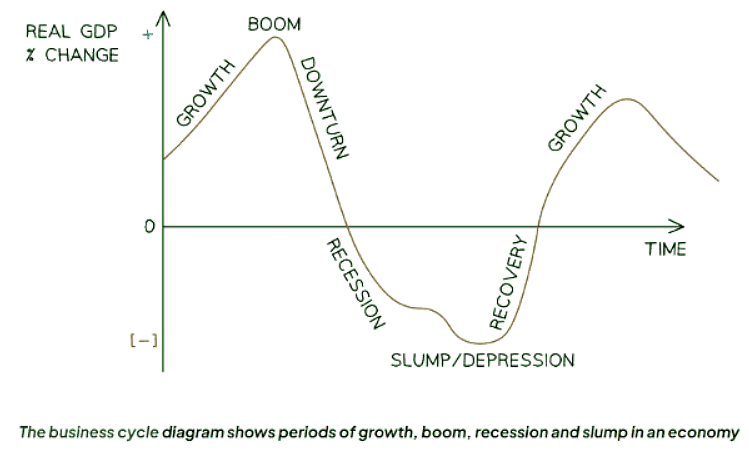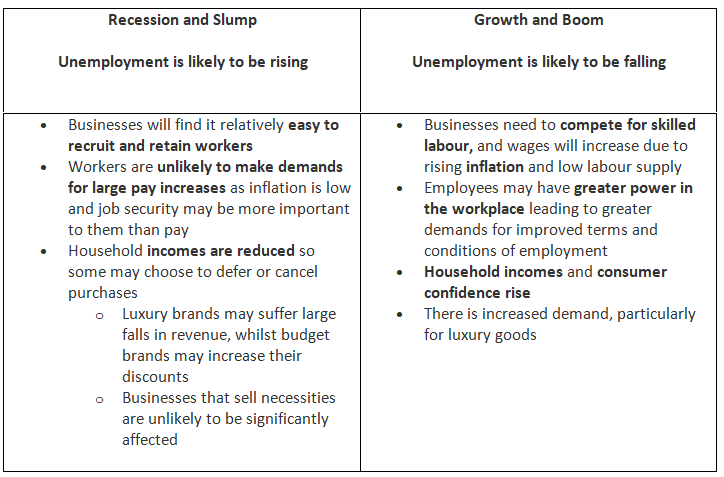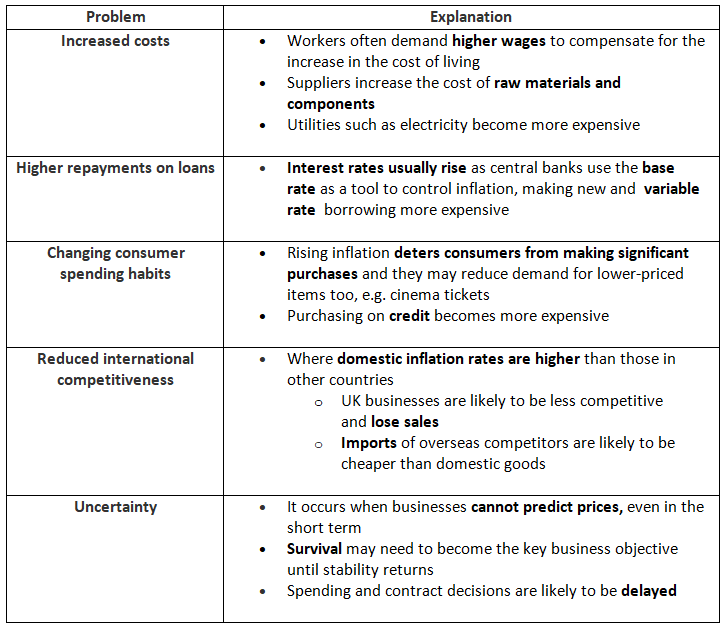Class 10 Exam > Class 10 Notes > Business Studies for GCSE/IGCSE > The Business Cycle
The Business Cycle | Business Studies for GCSE/IGCSE - Class 10 PDF Download
The main Stages of the Business Cycle
- The business cycle involves fluctuations in a country's economic activity (GDP) over time. Economies do not grow steadily.
- Economies go through periods of growth and decline.
Diagram: Business Cycle

- A recession ensues when an economy undergoes two successive quarters (equivalent to six months) or more of negative GDP growth.
- Declines in incomes and consumer demand result in reduced output.
- Both consumer and business confidence typically dwindle.
- Business profits decline, leading to a rise in unemployment.
- A slump refers to an extended duration of negative GDP growth.
- High levels of business failure contribute to elevated unemployment rates.
- Significant drops occur in household incomes and business profits.
- Increased government expenditure on welfare benefits and infrastructure projects aims to stimulate demand in the economy, potentially benefiting certain businesses.
- The growth stage denotes a period marked by escalating rates of GDP growth.
- Rising disposable incomes stimulate heightened demand for goods.
- This surge prompts an increase in production levels, fostering greater employment rates.
- Businesses seek expansion opportunities to bolster profits.
- A boom characterizes a sustained period of heightened rates of GDP growth within an economy.
- Both consumer incomes and business profits soar.
- Elevated inflation rates accompany the heightened demand for goods and services.
- Low unemployment levels and increased wages ensue from a scarcity of skilled labor.
The Impact on Business of Changes in Employment Levels
- Unemployment rates are intricately tied to the fluctuations in the business cycle.
Unemployment and the Business Cycle
 The Impact on Business of Changes in Inflation
The Impact on Business of Changes in Inflation
- Inflation signifies a continuous surge in prices within an economy over time.
- A price index in most nations monitors monthly price changes of a spectrum of goods and services, comparing them with earlier periods.
- Recent years have witnessed a substantial rise in inflation across Europe, notably in the UK where inflation peaked at over 11% in 2022 due to heightened fuel expenses. By late 2023, Eurozone inflation had moderated to 2.9%.
- Elevated or unstable inflation rates can pose significant challenges for businesses.
Problems Caused by Rising or Fluctuating Inflation

The Impact on Business of Changes in Gross Domestic Product (GDP)
- GDP increases are indicative of growth and boom phases.
- While inflation may escalate, augmented household incomes might offset heightened expenses.
- Challenges in recruiting and retaining workers may prompt businesses to seek labor importation from abroad.
- Although interest rates are likely to be elevated, heightened consumer confidence may sustain robust spending on high-value items.
- A decline in GDP is synonymous with recession and slump periods.
- Despite subdued inflation, household incomes will be under pressure, prompting cautious or reduced discretionary spending.
- Governments may implement measures to stimulate the economy, potentially resulting in enhanced public services, infrastructure development, or tax benefits for businesses.
- Businesses could capitalize on low-cost borrowing opportunities stemming from reduced interest rates and invest in future business expansion.
Question for The Business CycleTry yourself: During a recession, what is the most likely impact on business profits?View Solution
The document The Business Cycle | Business Studies for GCSE/IGCSE - Class 10 is a part of the Class 10 Course Business Studies for GCSE/IGCSE.
All you need of Class 10 at this link: Class 10
|
70 videos|93 docs|26 tests
|
FAQs on The Business Cycle - Business Studies for GCSE/IGCSE - Class 10
| 1. What are the main stages of the business cycle? |  |
Ans. The main stages of the business cycle are expansion, peak, contraction, and trough. During the expansion phase, the economy grows, reaching a peak where it is at its highest point before entering a contraction phase. This contraction leads to a trough, which is the lowest point before the cycle starts again.
| 2. How do changes in employment levels impact businesses? |  |
Ans. Changes in employment levels can impact businesses in various ways. When employment levels are high, businesses may experience increased consumer spending, leading to higher demand for goods and services. On the other hand, high employment levels can also lead to labor shortages and increased wages, which can affect a company's bottom line.
| 3. What is the impact of changes in inflation on businesses? |  |
Ans. Changes in inflation can impact businesses by affecting the purchasing power of consumers. High inflation rates can lead to increased costs for businesses, as the prices of goods and services rise. This can result in lower profit margins and decreased consumer spending.
| 4. How do changes in Gross Domestic Product (GDP) impact businesses? |  |
Ans. Changes in GDP can impact businesses in various ways. A growing GDP indicates a healthy economy, which can lead to increased consumer confidence and spending. On the other hand, a shrinking GDP can signal a recession, leading to decreased consumer spending and lower business revenues.
| 5. How can businesses navigate the business cycle to ensure stability and growth? |  |
Ans. Businesses can navigate the business cycle by implementing strategies such as diversifying their product offerings, building strong customer relationships, managing costs effectively, and staying agile in response to changing economic conditions. By understanding the stages of the business cycle and proactively planning for potential challenges, businesses can position themselves for stability and growth.
Related Searches
















